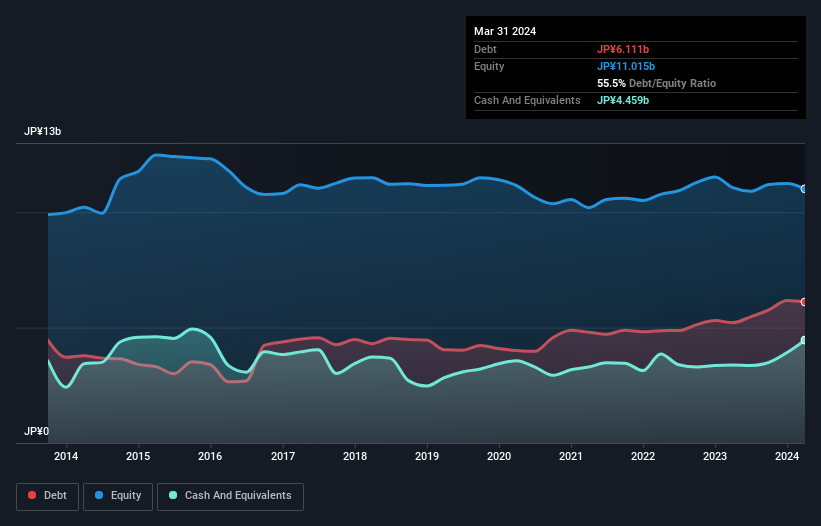
Howard Marks put it nicely when he said that, rather than worrying about share price volatility, 'The possibility of permanent loss is the risk I worry about... and every practical investor I know worries about.' So it might be obvious that you need to consider debt, when you think about how risky any given stock is, because too much debt can sink a company. Importantly, Meiwa Industry Co., Ltd. (TSE:7284) does carry debt. But the real question is whether this debt is making the company risky.
What Risk Does Debt Bring?
Debt is a tool to help businesses grow, but if a business is incapable of paying off its lenders, then it exists at their mercy. In the worst case scenario, a company can go bankrupt if it cannot pay its creditors. However, a more common (but still painful) scenario is that it has to raise new equity capital at a low price, thus permanently diluting shareholders. Of course, the upside of debt is that it often represents cheap capital, especially when it replaces dilution in a company with the ability to reinvest at high rates of return. The first step when considering a company's debt levels is to consider its cash and debt together.
Check out our latest analysis for Meiwa Industry
How Much Debt Does Meiwa Industry Carry?
The image below, which you can click on for greater detail, shows that at March 2024 Meiwa Industry had debt of JP¥6.11b, up from JP¥5.22b in one year. However, because it has a cash reserve of JP¥4.46b, its net debt is less, at about JP¥1.65b.

How Strong Is Meiwa Industry's Balance Sheet?
We can see from the most recent balance sheet that Meiwa Industry had liabilities of JP¥10.8b falling due within a year, and liabilities of JP¥2.94b due beyond that. On the other hand, it had cash of JP¥4.46b and JP¥5.90b worth of receivables due within a year. So it has liabilities totalling JP¥3.39b more than its cash and near-term receivables, combined.
When you consider that this deficiency exceeds the company's JP¥3.01b market capitalization, you might well be inclined to review the balance sheet intently. Hypothetically, extremely heavy dilution would be required if the company were forced to pay down its liabilities by raising capital at the current share price. The balance sheet is clearly the area to focus on when you are analysing debt. But it is Meiwa Industry's earnings that will influence how the balance sheet holds up in the future. So when considering debt, it's definitely worth looking at the earnings trend. Click here for an interactive snapshot.
In the last year Meiwa Industry wasn't profitable at an EBIT level, but managed to grow its revenue by 5.7%, to JP¥22b. That rate of growth is a bit slow for our taste, but it takes all types to make a world.
Caveat Emptor
Importantly, Meiwa Industry had an earnings before interest and tax (EBIT) loss over the last year. Its EBIT loss was a whopping JP¥422m. When we look at that alongside the significant liabilities, we're not particularly confident about the company. It would need to improve its operations quickly for us to be interested in it. Not least because it had negative free cash flow of JP¥334m over the last twelve months. That means it's on the risky side of things. When analysing debt levels, the balance sheet is the obvious place to start. But ultimately, every company can contain risks that exist outside of the balance sheet. For example, we've discovered 3 warning signs for Meiwa Industry (2 are significant!) that you should be aware of before investing here.
Of course, if you're the type of investor who prefers buying stocks without the burden of debt, then don't hesitate to discover our exclusive list of net cash growth stocks, today.
New: Manage All Your Stock Portfolios in One Place
We've created the ultimate portfolio companion for stock investors, and it's free.
• Connect an unlimited number of Portfolios and see your total in one currency
• Be alerted to new Warning Signs or Risks via email or mobile
• Track the Fair Value of your stocks
Have feedback on this article? Concerned about the content? Get in touch with us directly. Alternatively, email editorial-team (at) simplywallst.com.
This article by Simply Wall St is general in nature. We provide commentary based on historical data and analyst forecasts only using an unbiased methodology and our articles are not intended to be financial advice. It does not constitute a recommendation to buy or sell any stock, and does not take account of your objectives, or your financial situation. We aim to bring you long-term focused analysis driven by fundamental data. Note that our analysis may not factor in the latest price-sensitive company announcements or qualitative material. Simply Wall St has no position in any stocks mentioned.
Have feedback on this article? Concerned about the content? Get in touch with us directly. Alternatively, email editorial-team@simplywallst.com
About TSE:7284
Meiwa Industry
Manufactures and sells automotive interior parts in Japan.
Adequate balance sheet average dividend payer.
Market Insights
Community Narratives



